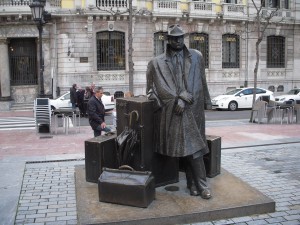 In corporate America, there are as many leadership styles as leaders. In my novel “Skyscrapers” I contrasted two CEO’s, both flawed. They shared a number of positive traits: alpha personality, a drive to succeed, an ability to manage a large and complex industry, enough charisma to motivate subordinates, and an ethos which so far had worked for them. At the beginning of the novel, they were in control of their lives and planning their next moves: Ellie Smith wanted to acquire Vern Webb’s company, while Webb was concentrating on expansion into the former Soviet satellite countries.
In corporate America, there are as many leadership styles as leaders. In my novel “Skyscrapers” I contrasted two CEO’s, both flawed. They shared a number of positive traits: alpha personality, a drive to succeed, an ability to manage a large and complex industry, enough charisma to motivate subordinates, and an ethos which so far had worked for them. At the beginning of the novel, they were in control of their lives and planning their next moves: Ellie Smith wanted to acquire Vern Webb’s company, while Webb was concentrating on expansion into the former Soviet satellite countries.
What are the traits that make a good leader great? Firstly, a vision that others can “buy into”, so that when it succeeds, it feels like everyone’s success. This vision is not a view of the world, it is a strategy the leader develops. He or she must then have the skill to obtain consensus from individuals who may initially approach the vision with some suspicion. Obtaining consensus is not left, by a great leader, to chance, it is part of the strategy. The good leader must be able to inspire and motivate others, and he or she must appropriately reward those who do well. Natural charisma helps here, because it makes others more likely to follow and to trust. Natural charisma also helps in promoting the business. An outstanding leader can inspire the marketplace with new product lines and well-timed publicity, projecting an image of power and competence into the public mind. Of course, a great leader must have excellent organizational skills in order to reach the top. Once there, interpersonal skills become more important as the organizational jobs are delegated to the faithful lieutenants who “buy into” the leader’s vision.
Ellie Smith and Vern Webb are CEO’s who both worked their way up, but in entirely different ways. Eleanora Torquemada was motivated by her determination to escape her impoverished immigrant background. She planned to be the next Carnegie or Vanderbilt. She put poverty behind her, married into the Smith family and then divorced Mr. Smith, and used liaisons with powerful men to enter into the world of high-level business, to learn their skills, to use them as sounding-boards, and to become one of them. But her flaw became apparent to her when she fell prey to random violence. As she recuperated, she had few visitors. The fact that she still looked down on her family meant few visits from them. Her ex-lovers sent flowers but didn’t visit. She had no one she loved deeply, and no children. When her second-in- command from the office visited, she felt he was disappointed she was going to survive. Ellie’s single-minded pursuit of her goal was too extreme. She failed to inspire and mentor her team successfully. They apparently were working for her rather than with her, and her feeling that if she died nobody would miss her came as an unpleasant eye-opener for her. It was a long overdue realization, and it changed the way she behaved later in the novel.
Vern Webb Sr. escaped a tormented background to get to the top. Rejected by his family, he went through a hippie and then criminal phase before summoning up a great deal of courage to extract himself from those entanglements (almost). He used his drug revenue to go to school and to climb the corporate ladder, helped by charisma and a raw determination to make up for lost time. He divorced his wife in favor of a trophy wife, he attracted positive press for his philanthropic work, he had a vision of where he was going to take the company, and his top lieutenants admired him for his toughness and the aura of danger he transmitted. They didn’t love him, but they didn’t want to cross him, either. They knew, from his willingness to pay bribes in Uzbekistan that he was morally ambiguous, but no one could have suspected that his greed had prevented him from breaking completely from his past. He was laundering drug money through his company. The fact that nobody knew about it was irrelevant. It made him a poor leader because it made him and his company vulnerable to sudden failure, ignominy, and many jobs lost.
Ellie had the integrity Vern lacked. Vern had the striking ability to command that Ellie worked hard to develop, but could not develop to the same degree. They were both successful because of their inner drive, organizational skill, sheer brains, and ability to get the best from others. But both did some painful learning in “Skyscrapers.” Vern had an almost Lucifer-like tumble, pride being among his flaws. Ellie entered into a painful period of reassessment and new growth, like an overgrown and harshly pruned-back plant. The novel reminds us that leaders who achieve the pinnacle of success can’t stay there forever. “Follow Me … Or Else!” can turn into “Where Has Everybody Gone?” overnight.
About the Author
Written by Jill Wilson Brennan
Jill lived in New York, Paris and London before settling in Chicago. She has had a very eclectic life, aspects of which appear in her new novel Skyscrapers. She has three children, all married, and serves as Director of a major children's hospital.


